Today at Kata-Karon municipal offices, representatives from about 35 resorts indicated they do not want to be part of the plan.
Most of the resorts have never been willing to warn guests in low season about the deadly rip currents.
It would be a major change in approach if they took up the plea by local authorities to tell tourists that umbrellas and beach chairs are only allowed on 10 percent of Phuket's beaches.
One resort representative asked at today's meeting whether the 10 percent was measured on a wild day at high tide or on a tranquil day at low tide.
The question revealed the underlying cynicism about Governor Nisit Jansomwong's plan to keep all the clutter of umbrellas and beach chairs contained in regimented portions of Phuket's beaches.
The truth is, tourists who visit beaches and the equipment hirers who were supposed to be banished forever by the military clearances last year don't like regimentation.
The governor's idea has little hope of working because nobody wants to enforce it.
The only organisation capable of making sure regulations are followed and properly protecting Phuket's beaches is the Royal Thai Navy.
Senior officers clearly believe the local councils and police, who have tended to avoid overseeing Phuket's beaches for decades, now need to step up.
They aren't at all keen. Nor are the resorts.
The suggestion today that because resorts benefitted from the appeal of Phuket's beaches, they should each provide a staffer to oversee guests' beach protection and services was greeted with a silence that speaks volumes.
Resorts traditionally take responsibility for what occurs on their premises but no responsibility for anything that happens beyond it.
Drownings? No, very few of them warn guests about rip currents.
Motorcycle crashes? We don't know of a single resort that sees it as a responsibility to warn guests about the danger of hiring motorcycles.
Today's meeting was another powerful persuader that Phuket authorities know nothing about beach culture and only a little about resorts and tourism.
We can only guess at what Vice Governor Somkiet Sangkaosutthirak will report back to Governor Nisit, who is about to leave Thailand for Europe and ITB Berlin.
Far too many questions remain unanswered about what the future holds for European tourists who previously have loved the Thai holiday island's beaches.
Patong remains a jumble of private enterprise, with the tourists who bring their own beach chairs declining to give up their places in the sun, or the shade, on Phuket's most popular beach.
Most people can see how disastrous it will be the moment that reluctant police are forced to act upon the handouts banning all beach chairs.
Images of officers struggling with elderly tourists will destroy the picture-postcard impression of friendly Phuket across Europe forever.
One hopes it never happens, and that the 10 percent concept is quickly replaced with a return to a genuine 100 percent clearance that sweeps private enterprise from the beaches yet allows tourists to bring their own beach chairs and umbrellas.
The problem is, Thai authorities know nothing about beach culture. They choose to ignore international examples and instead bow to commercial interests, making it up as they go along - a certain recipe for disaster.
Further north at Bang Tao beach, the moment everyone had been waiting for occurred today, with the return of the outlawed sunbeds.
The proof came in photographs posted on the Facebook page of Cherng Talay Mayor Ma-Ann Samran.
He, like the other Phuket mayors along the holiday island's coast, has the responsibility of making sure the sunbeds never return.
Until Phuketwan pointed them out tonight in photos posted to his Facebook page, Mayor Ma-Ann did not know the sunbeds had returned.
The mess that is Phuket's beach policy will only begin to be sorted with a return to a total ban on commercial equipment, with tourists allowed to bring their own umbrellas and beach chairs.
We do hope that is the governor's Plan B. It stands a much better chance of working.

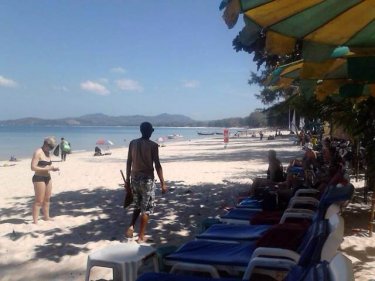





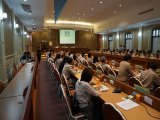
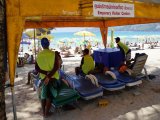
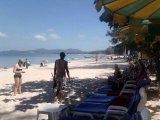


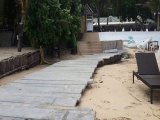
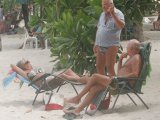
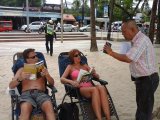
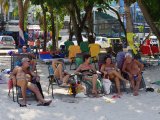
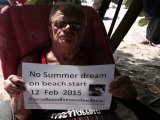




The Meridien does a good warning sheet on perils of motorbikes and jet skis and they have always been in forefront of lifeguard training, attended course there run by David from the Queensland Lifesaving
Posted by Michael on February 26, 2015 22:20
Editor Comment:
There are a few exceptions. Le Meridien is one. Tourist safety is a key priority. Telling them about beach arrangements is a different matter.